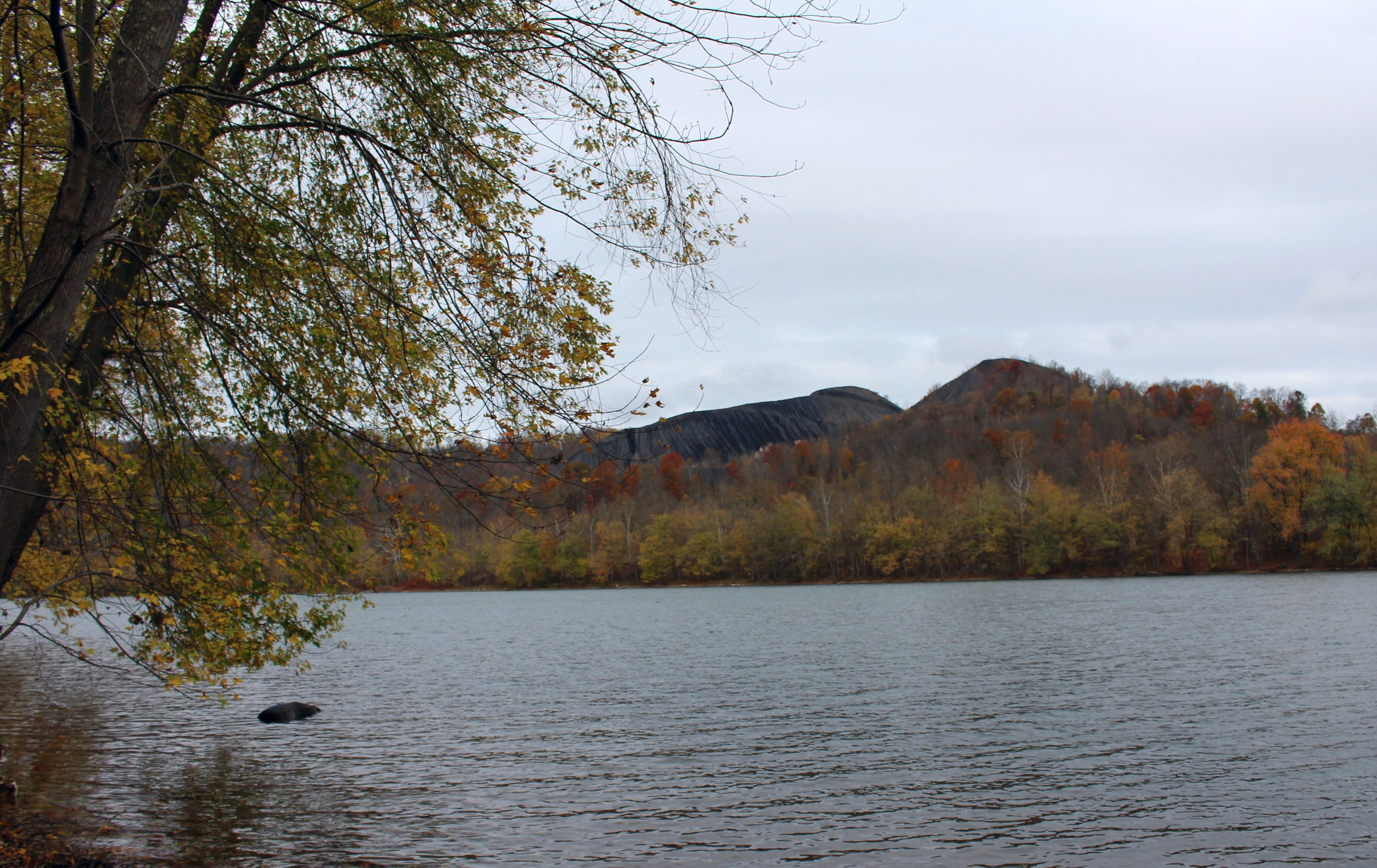
An old slag pile rises from behind the trees, next to the Monongahela River near Rice’s Landing in Greene County
Last week, the Mining and Reclamation Advisory Board met in Harrisburg to discuss various issues and updates. Many of the discussions and materials presented at the meeting will affect abandoned mine lands and current mining in Washington & Greene counties.
One reclamation project was completed in Midway Township, Washington County in 2015. According to current plans, there will be nine reclamation projects in Washington County in 2016 and 2017. Two of those projects for 2016 are rather large: Westland One in Chartiers Township (almost 61 acres) and Black Dog Hollow in East Bethlehem Township (45 acres). You can see the full list here. There are no reclamation projects scheduled for Greene County in the near future.
Another point of discussion at the meeting was a proposed revision to a Technical Guidance Document, a document that guides DEP staff in applying regulations to certain activities, for the Pre-Application Review Process for underground Coal Mining Activity Permits. CCJ has long been frustrated with the pre-application process and the deficiency letter process because PA DEP mining offices effectively walk applicants through the permit application process, assisting them with perfecting their applications before and after they have been submitted to the Department. We have long advocated for a policy that denies applications which are not complete or fail to comply with permit application requirements, rather than PA DEP staff walking private companies through the application process. Mining companies and the consulting firms that they hire to prepare permit applications have a lot of experience, knowledge, expertise, and money. They should be capable of putting together a permit application which meets DEP’s requirements and complies with applicable laws and regulations, without taxpayer money being spent on DEP staff time helping these companies and their consultants over months or years.
Now, DEP is planning to make the pre-application process for underground mines official by setting out guidelines for how it should be performed since the current Technical Guidance Document (TGD) on the pre-application process only covers surface mines. The California District Mining Office has been accepting pre-applications for years and working with permit applicants on their applications with a TGD, so it is unclear what the TGD might change about that process.
If the pre-application reviews are a waste of taxpayer resources, spending more DEP staff time creating a TGD for this process is even worse. Precious DEP resources could otherwise be spent revising other TGDs that guide staff on how to apply regulations which protect natural resources so that DEP can better conform its operations to the law, or perform inspections and pursue enforcement. Instead, DEP is devoting their time and energy to revising a document which facilitates the Department essentially working on behalf of permittees, guiding them through the application process, and at times, writing the application for them. This is not how taxpayer money should be spent- holding the hand of an industry and its consultants. It is unnecessary to take the time to outline these procedures because the pre-application process should be discontinued. You can read more here.
DEP is also proposing permit application fee increases for mining and mining-related permits, to being in january of 2018. However, looking over the list of proposed fee increases, it is all too obvious that they are still insufficient for the incredible amount of time and work that goes into the application review and permitting processes. The Mining and Reclamation Board seem to be out of touch with local district mining offices because permits for many one-time large projects have been applied for in the last year or two and are others are likely to be submitted before the new fees go into effect. For example, Consol’s proposed two Coal Refuse Disposal Areas (CRDAs) may very well be some of the last new CRDA applications submitted to DEP. Spanning nearly 2,000 acres, if permitted and constructed, these facilities could accommodate waste from Consol’s preparation plant until all of Consol’s mines close, keeping in mind market forces and emission reduction commitments. Moreover, it is absurd to think that a company will be constructing a new coal preparation facility in the future. The market does not support that type of investment now and it is extremely unlikely that the market will recover in the future to the point where a new preparation plant would be economically feasible, especially considering the limited amount of coal reserves left in Pennsylvania. You can review the proposed changes here.
Instead of some of the aforementioned work, we believe that DEP should be focused on improving public participation, posting permit application information and maps online to promote the transparency that Secretary Quigley has championed, revising the Department’s Environmental Justice Policy to better protect the rights of EJ communities and serve them, staffing the Office of Environmental Justice, and performing more inspections and issuing violations whenever they are found in order to ensure regulated entities are in compliance with the law.
